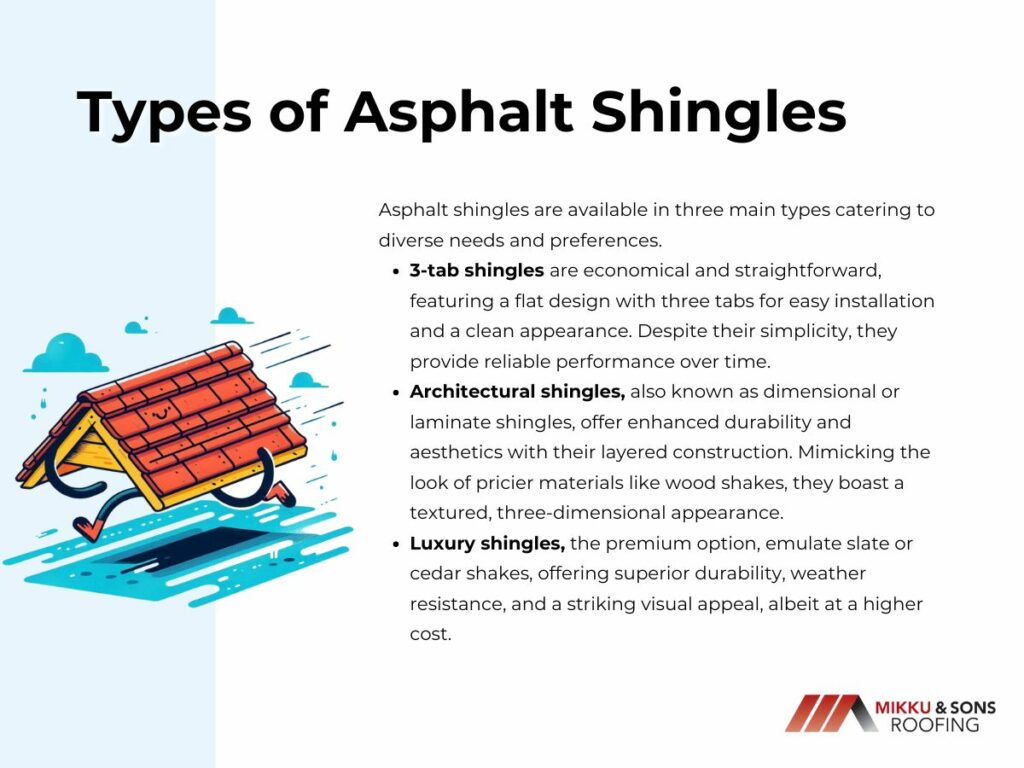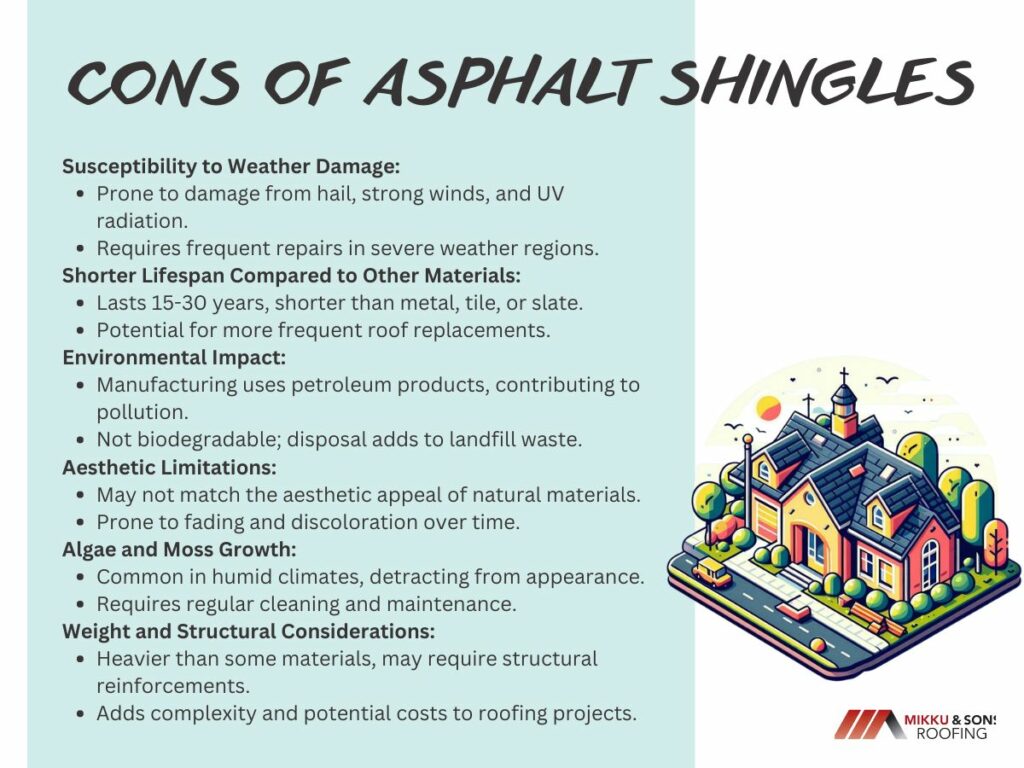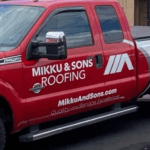

Asphalt shingles are one of the most popular roofing materials used in residential construction today. Known for their affordability and versatility, asphalt shingles offer homeowners an accessible option for protecting their homes from the elements.
With a wide range of colors, styles, and types available, they can easily complement various architectural designs and personal preferences. However, like any roofing material, asphalt shingles come with their own set of advantages and disadvantages.
Choosing the right roofing material is a crucial decision for homeowners, as it impacts not only the aesthetic appeal of the home but also its durability and maintenance needs. Let's look at the pros and cons of asphalt shingles.
Asphalt shingles are a widely used roofing material, known for their durability, affordability, and ease of installation. Made from a base mat of organic materials or fiberglass, these shingles are coated with asphalt and mineral granules that provide weather resistance and aesthetic appeal.
This combination of materials makes asphalt shingles a reliable choice for protecting homes against various environmental elements such as rain, wind, and UV radiation. The popularity of asphalt shingles stems from their versatility and the extensive range of options available to homeowners.
They can be found in numerous colors, styles, and textures, allowing homeowners to choose a look that complements their home’s architectural style. Advancements in manufacturing have led to the development of asphalt shingles that mimic the appearance of more expensive materials, such as wood, slate, or tile, at a fraction of the cost.
Asphalt shingles come in three main types: 3-tab shingles, architectural shingles, and luxury shingles. Each type offers unique benefits and caters to different aesthetic preferences and budget considerations.

3-tab shingles are the most basic and economical option. They are flat and consist of three uniform tabs, giving them a simple, clean appearance. These shingles are lightweight and easy to install, making them a popular choice for budget-conscious homeowners.
Despite their simplicity, 3-tab shingles offer reliable performance and protection for many years.
Architectural shingles, also known as dimensional or laminate shingles, are a step up in terms of both performance and aesthetics. These shingles are thicker and have a layered construction, which gives them a more textured, three-dimensional look.
Architectural shingles are designed to mimic the appearance of more expensive materials, such as wood shakes, and are generally more durable and longer-lasting than 3-tab shingles.
Luxury shingles represent the top tier of asphalt shingles. These high-end options are designed to closely resemble premium roofing materials like slate or cedar shakes.
Luxury shingles offer superior durability, enhanced weather resistance, and a striking aesthetic appeal. While they come at a higher cost, their longevity and visual impact make them an attractive choice for homeowners seeking the best in performance and style.
One of the most significant advantages of asphalt shingles is their cost-effectiveness. Compared to other roofing materials like metal, tile, or wood, asphalt shingles are much more affordable, both in terms of initial purchase price and installation costs. This makes them an attractive option for homeowners on a budget or those looking to maximize the value of their investment without compromising on quality.
Asphalt shingles also offer excellent long-term value. They require minimal maintenance and are relatively inexpensive to repair or replace if damaged.
This affordability extends to labor costs as well, as asphalt shingles are easier and quicker to install than many other roofing materials, reducing the overall expense of a roofing project.
Asphalt shingles are known for their versatility and the wide variety of options they provide. They come in numerous colors, styles, and textures, allowing homeowners to choose a look that perfectly matches their home’s architectural style and personal aesthetic preferences.
Whether you prefer the classic look of 3-tab shingles or the more textured appearance of architectural or luxury shingles, there is an asphalt shingle option to suit every taste. Asphalt shingles can be adapted to fit roofs of various shapes and sizes, making them suitable for a wide range of residential and commercial applications.
The ease of installation is another significant advantage of asphalt shingles. They are lightweight and easy to handle, which simplifies the installation process for roofing contractors.
This means that a new roof can be installed relatively quickly, minimizing disruption to the homeowner and reducing labor costs. The widespread familiarity with asphalt shingles means that finding a qualified roofing contractor to install them is straightforward.
Most roofing professionals have extensive experience working with asphalt shingles, ensuring that the installation process is smooth and efficient.
Despite their affordability, asphalt shingles are known for their durability and respectable lifespan. A well-maintained asphalt shingle roof can last between 15 and 30 years, depending on the quality of the shingles and the local climate.
Modern manufacturing techniques and materials have enhanced the durability of asphalt shingles, making them more resistant to damage from wind, rain, and UV radiation. The durability of asphalt shingles makes them a reliable choice for homeowners looking for a roofing material that can withstand various weather conditions.
Many asphalt shingles come with warranties that provide extra peace of mind, ensuring that your investment is protected for years to come.
One of the appealing aspects of asphalt shingles is their low maintenance requirements. Unlike some other roofing materials that may require regular upkeep and treatments, asphalt shingles generally need only periodic inspections and basic maintenance to keep them in good condition.
This includes tasks like clearing debris, checking for damaged shingles, and ensuring proper ventilation. The ease of maintenance associated with asphalt shingles can save homeowners both time and money in the long run.
Simple repairs, such as replacing individual shingles, are straightforward and can often be done by the homeowner or a professional at a minimal cost.
Asphalt shingles can contribute to the energy efficiency of a home, especially when they are designed with reflective properties. Cool roofing shingles, which are specifically engineered to reflect more sunlight and absorb less heat, can help reduce the cooling load on a home during hot weather.
This can lead to lower energy bills and a more comfortable living environment. Energy-efficient asphalt shingles are available in various colors and styles, ensuring that homeowners do not have to sacrifice aesthetics for performance.
Fire resistance is another notable benefit of asphalt shingles, particularly those made with fiberglass. Fiberglass asphalt shingles are inherently more fire-resistant than their organic counterparts, making them a safer choice for homes in areas prone to wildfires or other fire hazards.
These shingles often come with Class A fire ratings, the highest rating available for residential roofing materials. The fire-resistant properties of asphalt shingles provide an added layer of protection for homeowners, helping to safeguard their property and enhance overall safety.

One of the primary drawbacks of asphalt shingles is their susceptibility to weather damage. While they are generally durable, extreme weather conditions such as hailstorms, heavy winds, and intense sunlight can cause significant damage.
Hail can dent or crack the shingles, strong winds can lift or tear them off the roof, and prolonged exposure to UV radiation can lead to brittleness and cracking over time. In regions prone to severe weather, homeowners may find themselves needing frequent repairs or even premature roof replacements.
Although asphalt shingles can last between 15 to 30 years, their lifespan is generally shorter compared to other roofing materials like metal, tile, or slate. These alternative materials can last 50 years or more, providing a more long-term solution for homeowners willing to invest in higher initial costs.
The shorter lifespan of asphalt shingles means that homeowners may need to replace their roofs sooner than if they had chosen a more durable material. This can be a significant consideration for those looking to minimize the frequency of major home maintenance projects and associated costs.
Asphalt shingles have a notable environmental impact, both in terms of their production and disposal. The manufacturing process involves the use of petroleum products, which contributes to environmental pollution and the depletion of natural resources.
Disposal of asphalt shingles is another environmental concern. They are not biodegradable and can take up significant space in landfills. While recycling programs for asphalt shingles do exist, they are not widespread, and many shingles still end up contributing to landfill waste.
This makes asphalt shingles a less eco-friendly option compared to materials like metal or clay tiles, which can be more easily recycled.
While asphalt shingles offer a variety of colors and styles, they may not provide the same level of aesthetic appeal as some premium roofing materials. For instance, natural materials like slate, wood shakes, or clay tiles can offer a unique and luxurious look that asphalt shingles cannot fully replicate.
Additionally, asphalt shingles are prone to fading and discoloration over time, especially with prolonged exposure to sunlight. This can detract from the overall appearance of the roof and may require periodic cleaning or replacement of discolored shingles to maintain curb appeal.
In humid climates, asphalt shingles can be susceptible to algae and moss growth. This not only affects the appearance of the roof, giving it a streaked or stained look, but can also compromise the shingles' integrity.
Moss can retain moisture against the shingles, leading to increased wear and potential damage over time. Homeowners may need to invest in regular cleaning and maintenance to prevent and treat algae and moss growth.
Choosing shingles treated with algae-resistant coatings can help mitigate this issue, though it may come at an added cost.
Although asphalt shingles are lighter than some roofing materials like tile or slate, they are heavier than others, such as metal. This weight can be a consideration in the structural design of a home, especially for older buildings that may not have been designed to support modern roofing materials.
In some cases, the additional weight of asphalt shingles may necessitate structural reinforcements, adding to the overall cost and complexity of a roofing project. It is essential for homeowners to assess their roof's load-bearing capacity and consult with a professional to ensure that asphalt shingles are a suitable choice for their specific situation.
Asphalt shingles offer a range of benefits, including affordability, versatility, ease of installation, and decent durability, making them a popular choice for many homeowners. Roof pitch, or the slope of your roof, significantly influences drainage and weather resistance.
Steeper roofs provide better water runoff, reducing the risk of leaks and water damage, which can extend the lifespan of asphalt shingles. From an aesthetic standpoint, the pitch of the roof can enhance the visual appeal of asphalt shingles by showcasing their texture and color variations more prominently.
Making educated decisions about asphalt shingle performance and appearance can be facilitated by taking roof pitch into account. You can be sure that the roofing solution you choose will give your house the best possible protection, longevity, and curb appeal by speaking with roofing professionals about the material and the pitch of the roof.
